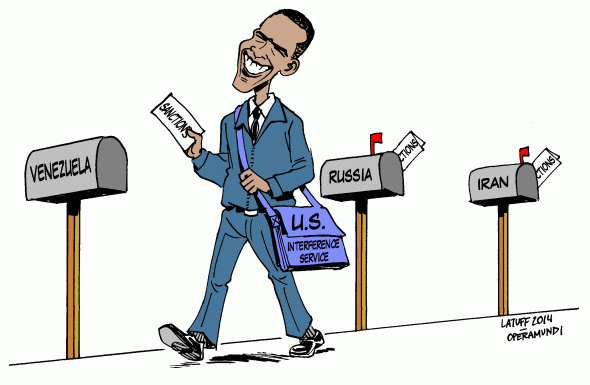Since the Obama administration decided last week to impose new sanctions on Venezuela, many people, including journalists, have inquired as to what motivated them to do this. Some are curious as to the apparent incongruity between this move and the White House decision in December to begin the process of normalizing relations with Cuba. Others are wondering why the administration would do something that so obviously hurts the opposition in Venezuela, at least in the short run. The main opposition group, the Democratic Unity Roundtable (MUD), issued a statement that did not support the sanctions: “Venezuela is not a threat to anyone,” it said in response to the White House’s absurd claim that Venezuela posed an “extraordinary threat” to U.S. national security. And then there is the problem of Washington’s isolation in the hemisphere, which has certainly increased with this latest move.
The contradiction between the Venezuela sanctions and the opening to Cuba is probably more apparent than real. A majority of the U.S. foreign policy establishment has wanted to normalize relations with Cuba since at least the 1990s. There is money to be made there, and most of those interested in getting rid of the Cuban government seem to believe – correctly or not – that it will be easier to do so if the island is opened up to commercial relations with the U.S. So beginning to normalize relations with Cuba is generally consistent with the broader strategy of opposition to Venezuela and other left governments that have been elected and re-elected since 1998.
It is only inconsistent if one sees the opening to Cuba as the beginning of a change in overall U.S. strategy for the region, one that seeks to reconcile with the huge hemispheric political shift that has taken place in the 21st century — sometimes known as Latin America’s “second independence.” President Rafael Correa of Ecuador succinctly expressed the regional governments’ disgust with the latest sanctions, saying that it “reminds us of the darkest hours of our America, when we received invasions and dictatorships imposed by the imperialists.” He then asked, “Can’t they understand that Latin America has changed?” The short answer to his question is no. Washington is still some ways away from the hemispheric equivalent of Nixon’s trip to China in 1972, which was not just about beginning a process of opening diplomatic or commercial relations but also about coming to grips with the new reality that an independent “Communist China” was here to stay.

